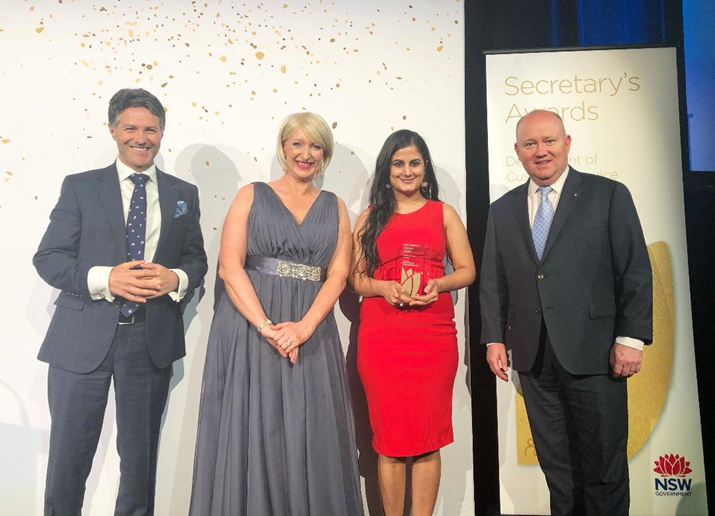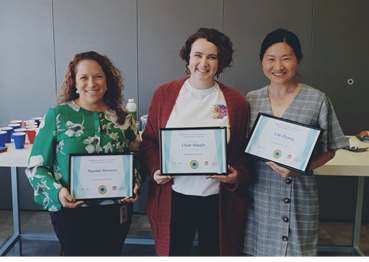At the Department of Customer Service, we are working hard to achieve the Premier's Priority of building World Class Public Service. We recognise that diversity delivers better outcomes and are driving initiatives to increase the number of women working in digital. From facilitating networking and learning opportunities to more inclusive recruitment practices, we talk to three senior leaders within our department to learn more.
Narelle Underwood is the Surveyor-General of NSW and is responsible for the leadership and regulation of the land and mining surveying profession and plays a key advocacy role in the geospatial industry. Narelle is a strong advocate of supporting more women in STEM roles and is the Chair of the NSW Surveying Taskforce. As the President of Board of Surveying and Spatial Information, she supports the NSW Surveyor General's Women in Surveying Undergraduate Scholarship and is working with NSW Department of Education to redevelop the surveying and geospatial engineering elective within the iSTEM program to encourage more diverse participation.
Jody Grima PSM is our Chief People Officer at the Department of Customer Service and is a passionate advocate for the development of teams and individuals. DCS is supporting women and professionals to step into technology-based roles via the Service NSW Digital Bootcamp.
Anthony Ritchie (Tony) is the Group Chief Information Officer at the Department of Customer Service and has over 25 years of experience in both business and technology leadership roles. He is a strong supporter for having more women in technology-based roles within DCS and has been an advocate for the DCS Women in Technology Network.
What does the gender balance feel like today?
In the last few years, we've seen more women join the technology workforce in DCS and generally also across NSW Public Sector. There has also been a greater emphasis on being open and transparent about it.
Jody: DCS is a leader in this area, particularly when it comes to women in leadership and women in technology-based roles. Over recent years there has been a greater emphasis on giving more women a voice and a platform to share their stories, showcase talent, connect with others, and empower one another. DCS Women in Technology Network is a great example of that. To build on this, we need to continue to drive our focus on diversity and inclusion to ensure representation from other groups, to lift them up too, leveraging some of the great work already done in this space.
Narelle: To meet the Premier's Priorities we need diversity at every level, and we need to make sure we are retaining, developing and promoting our existing workforce as well. It important to understand what diversity and inclusion means to our people. Many of the barriers for women in STEM have been removed, but we need to ensure they feel included, involved and supported. A lot of women leave careers because they don't feel the culture is inclusive.
Tony: Even though we now have more women in technology-based roles, it is also important to build greater participation for women at senior executive and technology leadership roles as well. We've moved further up the curve and women now represent about 30% of the roles in technology sector in general. We aren't there yet though, and more work needs to be done. Different initiatives such as flexible working policy, creating a friendly workplace environment, the DCS WiT Network and having a greater emphasis on diversity and inclusion while doing recruitment have been steps in moving towards the right direction.
What do you think we need to focus on in years to come?
Narelle: Engagement across different areas and experience. It is important to create an environment where we empower everyone to be lifelong learners, challenge existing ways of thinking and spark innovation.
Jody:Giving our people the ability and confidence to bring their diverse ideas, thoughts and perspectives to work, empowering them to suggest things and drive their own career journey. Lifting the confidence of our staff and empowering them to become a driver of change. Finding the right balance between customer experience and the employee experience is also key to success. If we're talking specifically about women in technology, it's crucial that we ensure we have inclusive leadership practices within DCS and the broader NSW Public Sector to drive tangible change and encourage more women to come into the technology industry.
Tony: Students make career choices in their early school days (Year 9 and Year 10), and we need to start early. Learning technology skills via innovative ways such as robotics programming should be taught earlier in schools to ensure students make an informed choice when they select career pathways.
The network's focus is to drive positive impact through empowerment, education, and engagement. The network strives to uplift skills and digital capabilities of all employees across DCS and support their career progression. This ensures that we are building a strong workforce of future leaders and encouraging networking across DCS, and across other NSW Government departments.
The Women in Technology Network
The Department of Customer Service Women in Technology Network (WiT) hosts monthly professional networking and learning events for women working in digital roles from across the Department of Customer Service and the NSW Public Service more broadly. We've had attendees from Transport for NSW, NSW Education, TAFE NSW, NSW Parliament, NSW Treasury, eHealth NSW and NSW Parliament. Last year we also launched the Women in Technology Learning Playlist, which has a range of online resources. Our efforts were recognised last year through both the DCS Secretary's Award for Making Inclusion Happen, and the DCS Leadership Excellence Award in 2020.
To learn more about the DCS Women in Technology Network, please email DCSWIT@customerservice.nsw.gov.au. Please include your name, agency/department and email address in your email.

